It’s Not Easy Being Seen: SEO Considerations for Brand Naming & Entities
Posted in Search & Social
Your new brand name may appear to have all the boxes checked—but does it have true potential to perform in search? With a little help from Kermit the Frog, this article explains what an entity is in Google, how it impacts SEO, and how to vet brand names to improve visibility.
First, Some Background
What’s a Brand Entity?
A brand entity is the full personality and image of a brand as seen by the public. The logo, name, slogan, how it communicates, what it stands for, and the experience it offers to customers—all of these parts combine to create a unique identity that connects with people and stands out in a crowded market. When a brand has a distinct entity, it builds a stronger impression and creates lasting loyalty with its customers.
In Google, an entity is a distinct, identifiable thing—a person, place, organization, or concept that Google is able to recognize as unique unto itself. Recognizing something as an entity makes it easier for Google to identify and connect all the disparate mentions of that something’s attributes (e.g., products), relationships (e.g., owner and employees), and context (e.g., industry) within its Knowledge Graph and search algorithms.
Kermit the Frog is a fun example of an entity. Take a moment to marvel at that impressive knowledge panel… Google clearly understands who Kermit is.
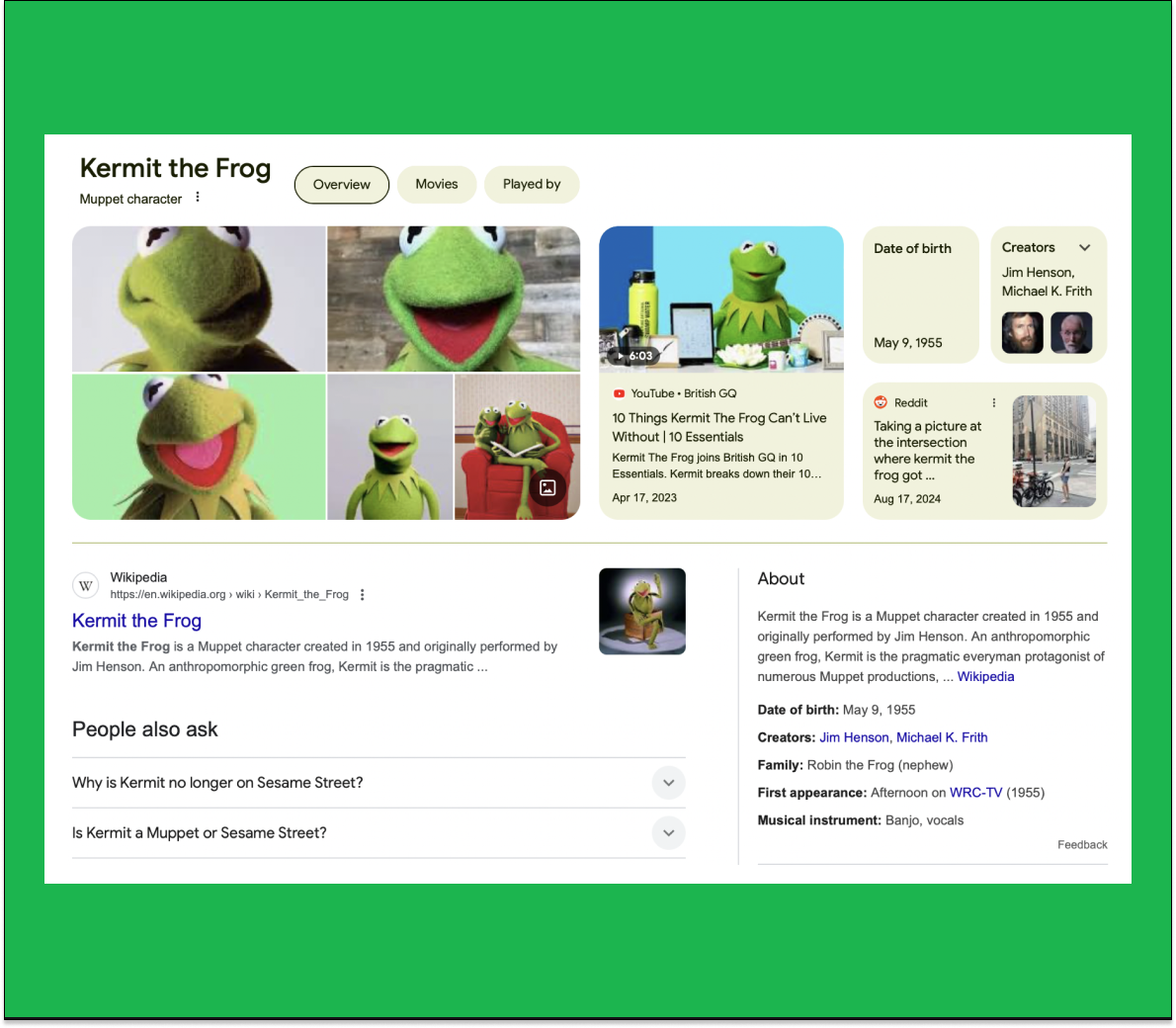
If you have a brand or you’re working to build one, having a recognizable brand entity enables Google to identify and connect mentions of your brand’s attributes, relationships, and context to improve your visibility in search.
Search engines use natural language processing (NLP) to figure out how content relates to an entity (or not), especially when it comes to words or phrases that have more than one interpretation.
Case in point: our own brand name, FINE, is a tricky one. If someone types “fine” into a search engine, it could mean any number of things. While our website appears in the top 10 results (thanks to more than two decades of building relevance in Google), it's clear that there's no single entity aligned with generalized searches for "fine."
However, if someone types in “fine portland,” “fine agency,” or the like into search, Google effortlessly returns results for our brand entity that include:
- FINE’s website, complete with featured sitelinks
- FINE's LinkedIn & Instagram
- FINE Google Business Profile with photos, reviews, studio address, and more.
Google's able to understand that FINE is a digital branding agency because there are tons of mentions, profiles, articles, and content about FINE online. Without those existing mentions, FINE could have serious trouble getting recognized as an entity by Google, which would make it very hard for people to find FINE online.
Google’s Secret? Strong Signals from Strong Brands
Back in the 1990s, the early days of the Internet, users switched back and forth between a range of search engines, from AltaVista and Dogpile to Ask Jeeves and WebCrawler—none of which ever seemed to return the results you were looking for. But by the early 2000s, one search engine had emerged as a favorite, noted for its ability to return highly relevant results: Google.
Why was Google so good at figuring out which sites were better than others? Google had developed a proprietary system called PageRank, which measured a website’s trust and authority based on how many other websites linked to it. Because the more websites that point to yours, the more relevant yours must be, right?
Fast forward to the present, and the use of external signals to evaluate website quality has grown vastly more complex. Beyond measuring mere links, fun new ranking factors now include clickstream data, which adjusts rankings based on an individual user’s clicks across pages, and the amount of search volume around your brand name.
In May 2024, the Google API Leak—which revealed the inner workings of Google’s entire algorithm—further underscored how critical it is to have a strong brand to perform well in the digital sphere. Strong brands tend to share key characteristics that search engines reward, which include:
- Lots of incoming links from high-authority domains
- Lots of unlinked mentions of your brand name
- A website that engages (and thereby retains) users (see NavBoost)
- High search volume around your brand name
When you take the time to build a really strong brand, these signals naturally follow, helping to benefit your brand in search engine results pages (SERPs).
Now to Tactics
How to Vet a Potential Brand Name as an Entity for SEO
SEO shouldn’t be the only consideration when choosing a name (here’s looking at you, taco shop near me). However, having a recognizable brand entity can give you a considerable advantage in search, which can translate to a considerable advantage overall.
At a global level, it can be difficult to come up with a new, single-word brand name that doesn’t overlap with an existing entity. For the purpose of this article, we're going to focus on potential entities that specifically avoid overlaps with other brands on an industry or geographic level. (However, if you're looking to identify a potential entity that avoids overlaps with any brands, anywhere, on a global level, we'd suggest hiring someone for that.)
SEO brand-naming strategy should include both keyword and SERP (search engine results page) analysis.
Keyword Analysis:
- Seed Brand Name + Keyword: Can we add a strategic keyword (e.g., “the Frog”) to the brand name (e.g., “Kermit”) for improved relevance?
- Domain Names: Can we secure a domain name that incorporates a strategic keyword for higher ranking?
SERP Analysis:
- Google Suggest: What shows up in Google Suggest (aka the list of keywords that Google suggests when you start to type a keyword into the search box)? (This can uncover potential competing entities and concepts.)
- General SERPs: What does the seed brand name return in search?
- Industry SERPs: What does the seed brand name + industry qualifier (ex: apartments) return in search?
- Local SERPs: What does this seed brand name + location (ex: Brooklyn) return in search, including local SERPs?
Tactics in Action: A Sample SEO Brand-Naming Strategy
Let’s say we're trying to name a new mixed-use luxury apartment community opening in Prospect Heights, Brooklyn. So far, potential seed names include “Harlowe,” “Myrtle,” “Vera,” and “The Grantham.” Here are key questions to consider when vetting these names.
What are our options for incorporating a keyword into the brand name?
Keyword research will inform the terms most critical to your brand. After performing this research (or hiring someone to do it for you), you’ll want to assess if you can combine your seed brand name (“Kermit”) with a keyword (“the Frog”) so that your brand entity is associated with that strategic keyword.
We want to incorporate keywords on an industry or geographic level. For this sample project, this translates to using “apartments” or words related to the location (e.g., “Brooklyn” or “Prospect Heights”)—both of which are high-volume concepts that help users understand the core offering. Considering the seed names above, that might look something like this:
- “Myrtle Apartments”
- “Myrtle Brooklyn”
- “Vera Prospect Heights”
- “The Grantham Apartments”
- “Harlowe Prospect Heights”
- And many more. You should evaluate lots of ideas when tackling a research project like this.
Now that we have our list, we want to examine whether these brand names are available.
Can we secure a domain name URL that incorporates a keyword?
Above all, domain names need to be easy to read and easy to type. But if there’s a solid opportunity to incorporate a keyword, you should take it.
For brands that are targeting a specific industry as well as a specific location, I like the idea of targeting one keyword in the domain with a complementary one in the entity (this covering both location + industry), but this can depend on the specific case as well as your personal preference. Here are some examples:
- myrtlebrooklyn.com – Available
- thegranthamapartments.com – Available
- veraprospectheights.com – Available
- myrtle-apartments.com – Available but hyphens are hard to type, so we don’t recommend them
- harloweapartments.com – Do’h, this is taken by an existing property. That's a red flag.
What is Google Suggest returning for keyword searches?
Do other local businesses appear when we search for the seed term + geo qualifier? Do apartment communities appear when we search for seed term + apartments?
For example, it’s looking likely that “Harlowe” is out, given that three different apartment communities appear in the Google Suggest results below.
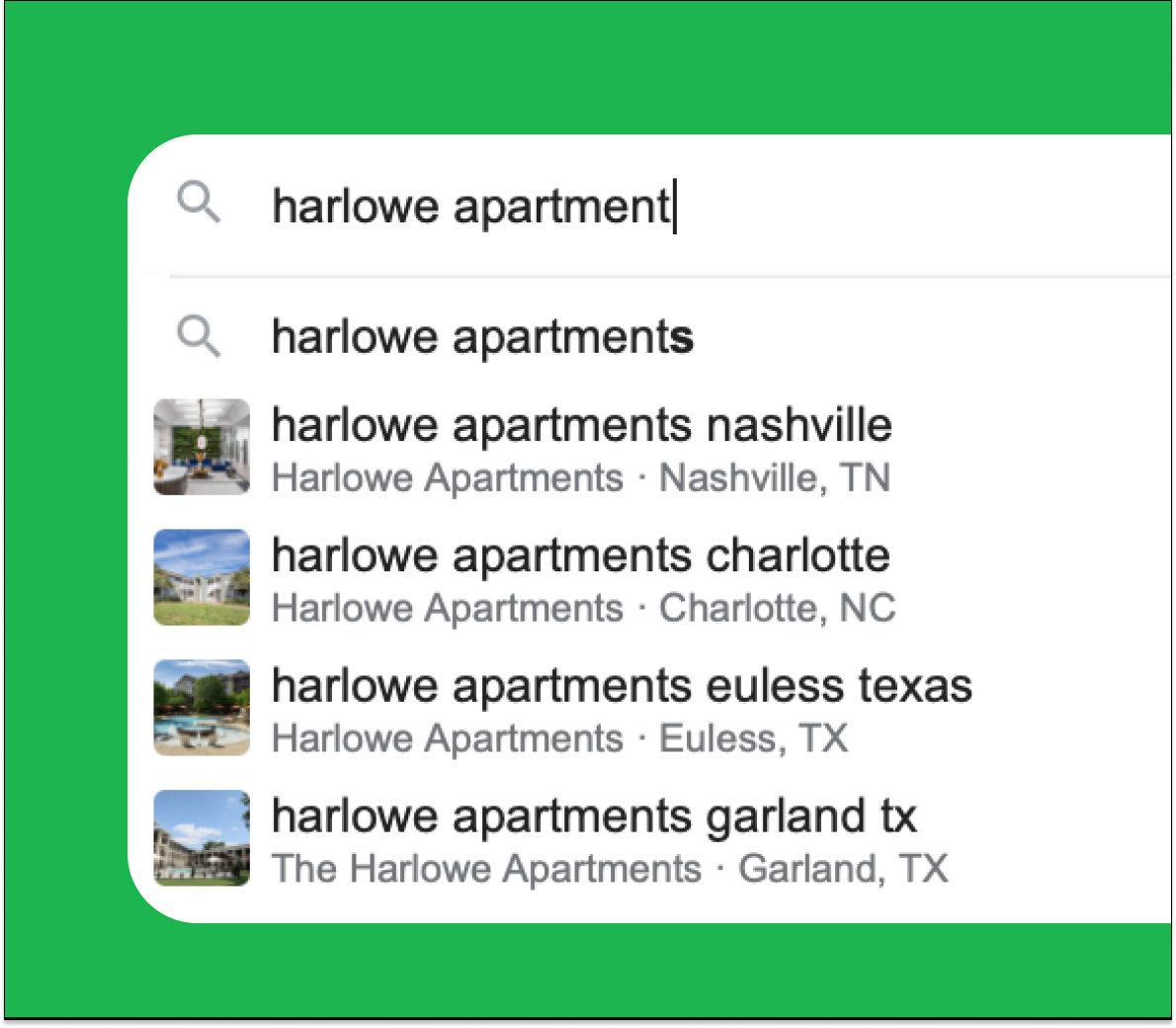
“Myrtle Brooklyn” is also looking a bit messy as well since a lot of related local businesses come up.
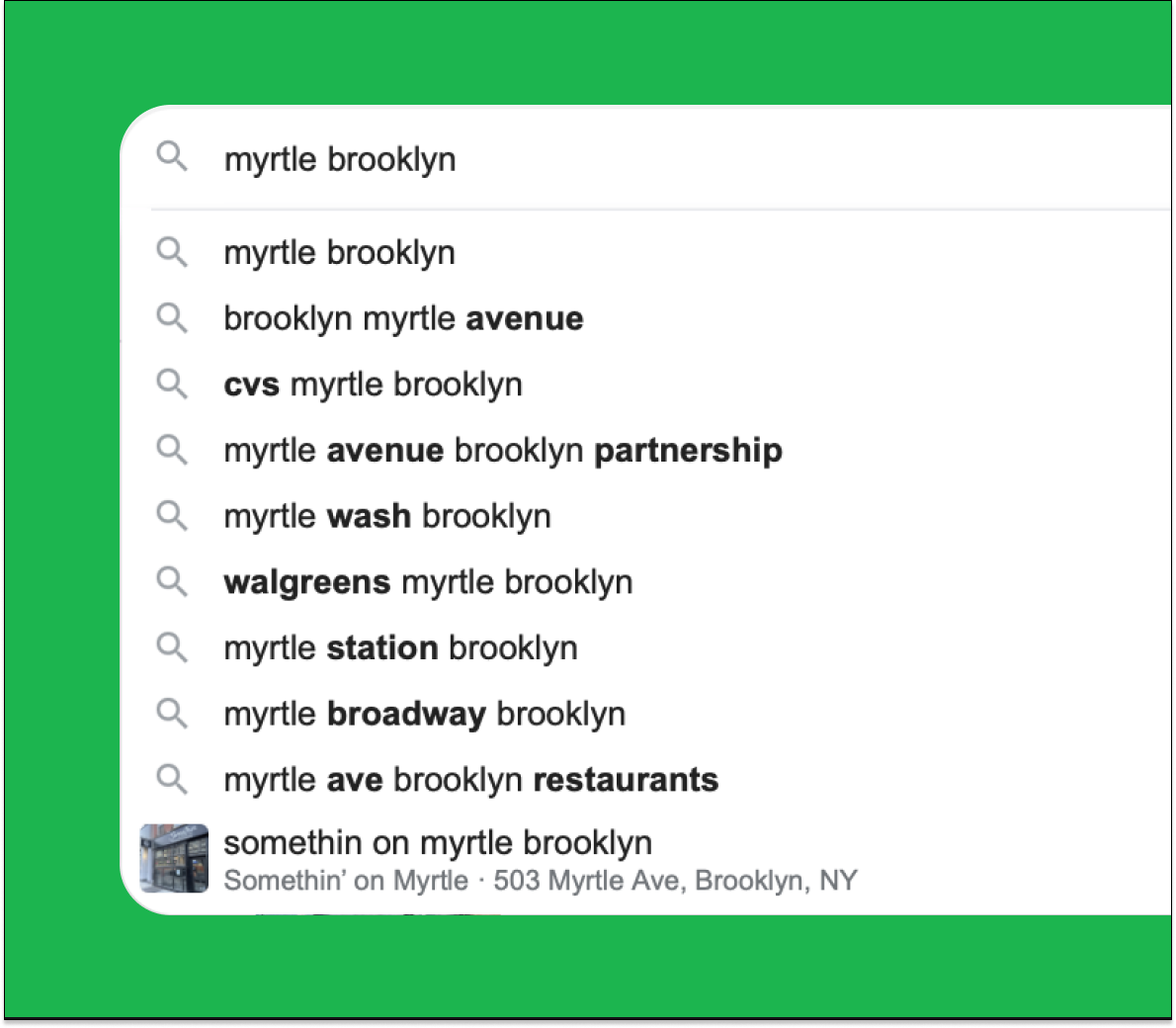
What does the seed brand name (alone) return in SERPs?
Most one-word seed terms (ex: "Kermit", "Myrtle", "Vera") will return global results that we can’t expect to compete on. Still, we recommend searching to double check that the seed name isn’t, for example, a detested villain, an unintended topic of controversy, or a common typo for some saucy slang.
Vera, for example, turns out to be associated with a beloved, tart-tongued British DCI from Northumberland. No objections there.
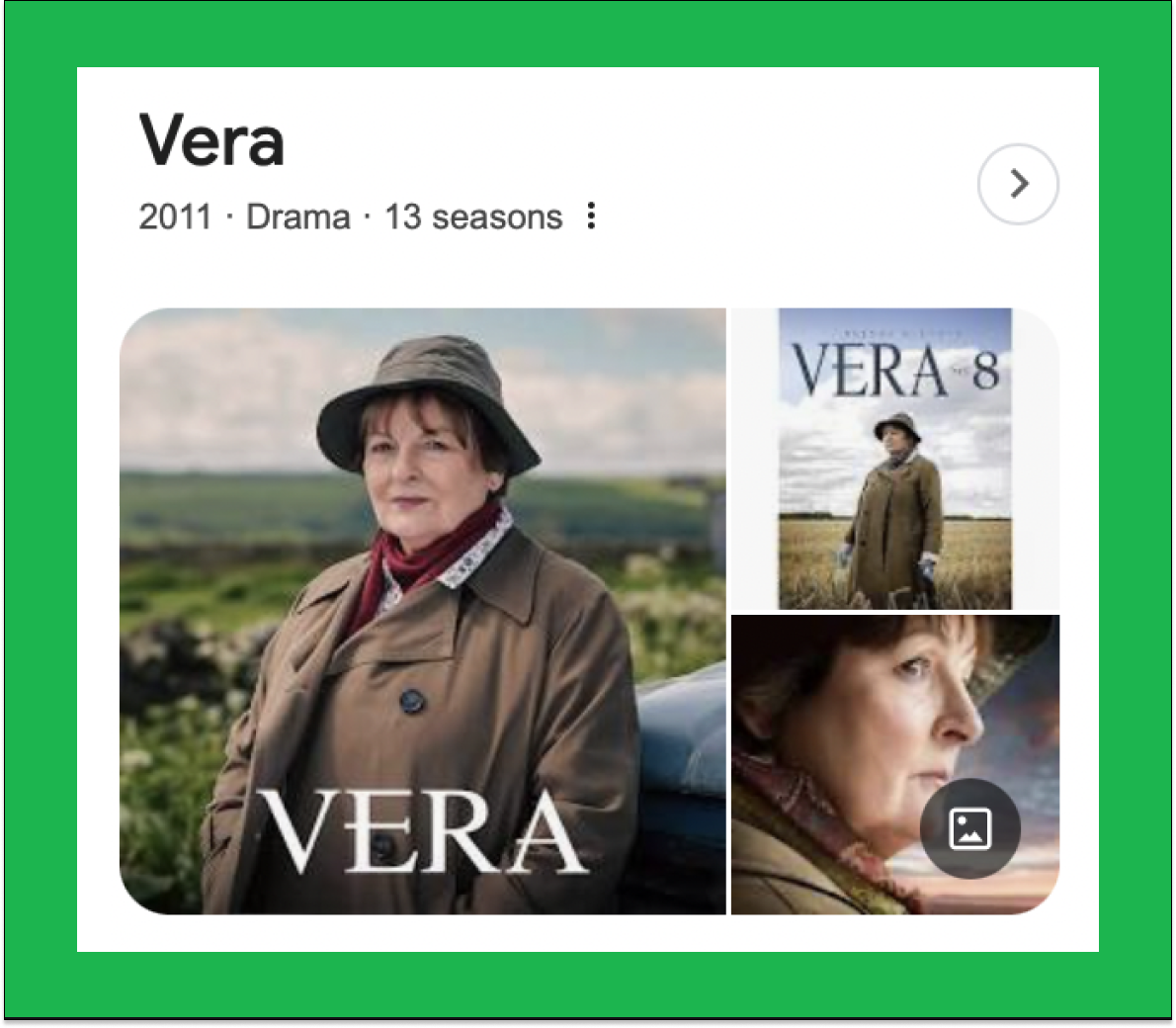
What does the seed brand name + industry qualifier return?
Out of all of the potential names, Harlowe has the most conflict from a competitor standpoint. Two different apartment community brands, each with their own unique domain name, appear prominently in SERPs, reiterating our earlier suspicion that it’s not a strong contender for an ownable brand entity.
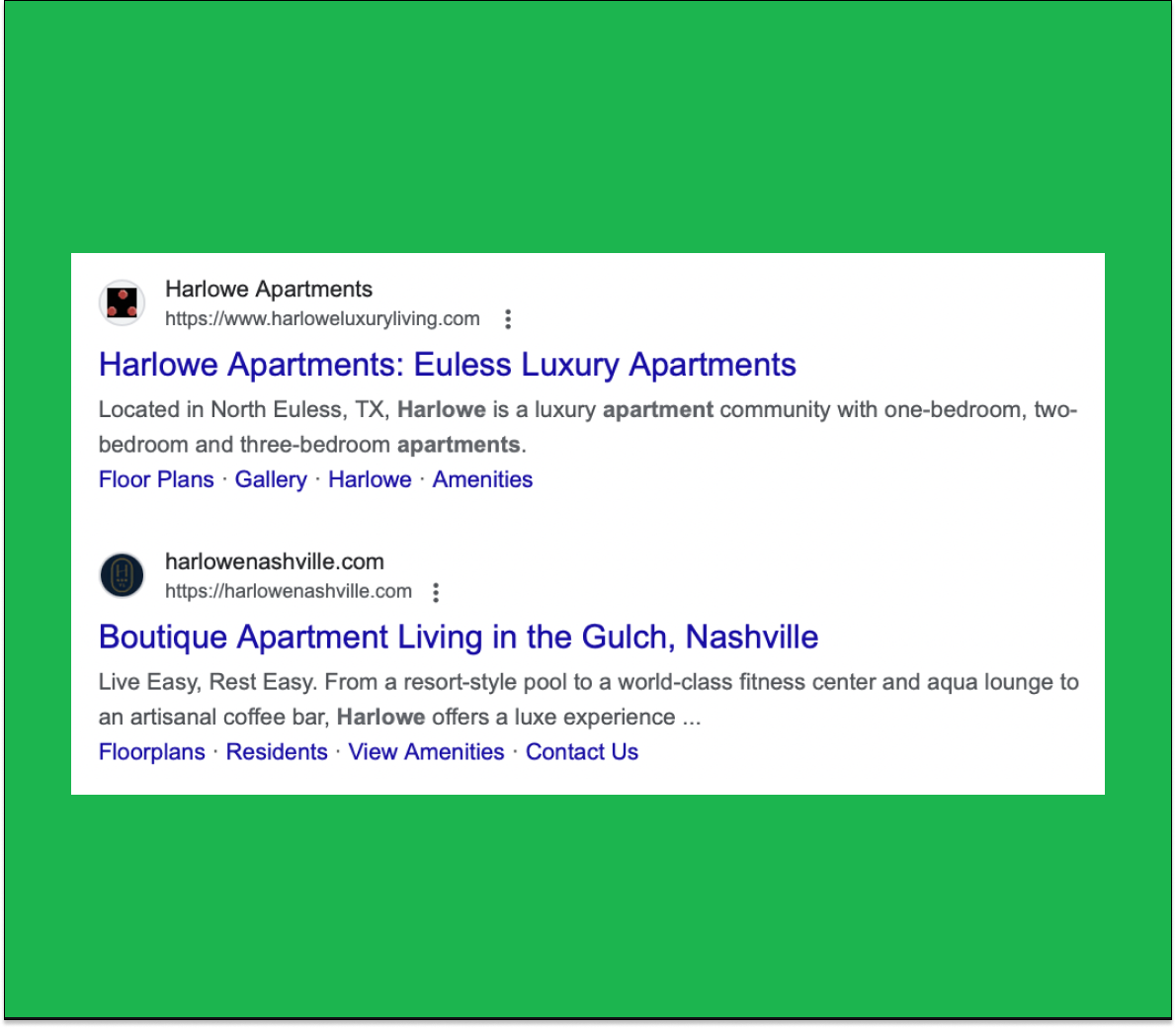
While other seed names also generate competing properties, most at least do not live at their own custom-branded domain. For example, no custom domains were found for "Myrtle Apartments.”
What does the seed brand name + location return?
Let's check out "Myrtle" first, searching around "Myrtle + Brooklyn"...
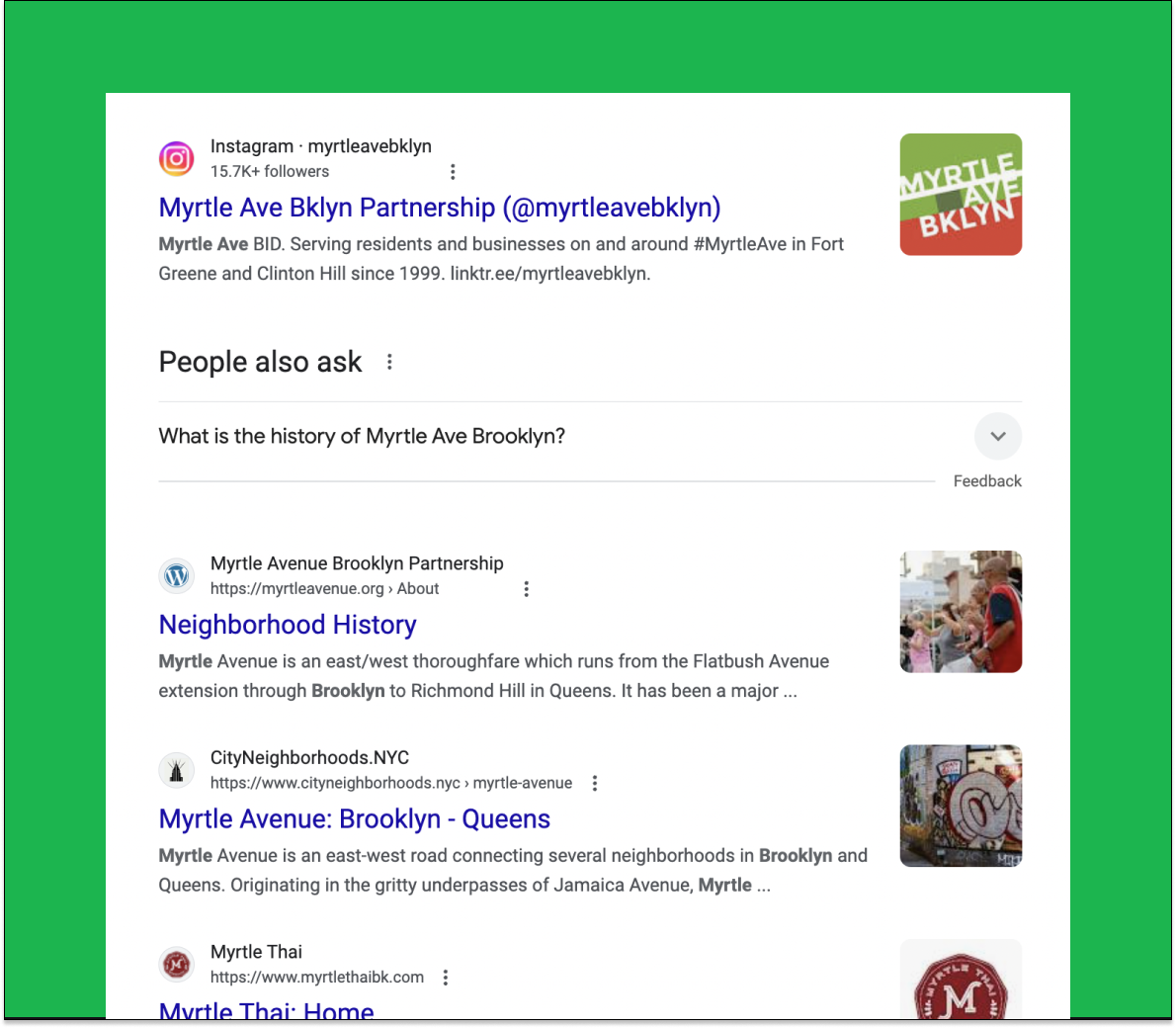
Dang. Since we know users, as prospective residents, will be searching for apartments in a specific location, it looks like there are way too many other Myrtles in Brooklyn that would pose an entity conflict.
Out of all the candidates, Grantham seems to return the most promising SERPs, with no competing local entities found, even when searching in and around greater New York and in Whitespark's Free Google Local Rank Checker.
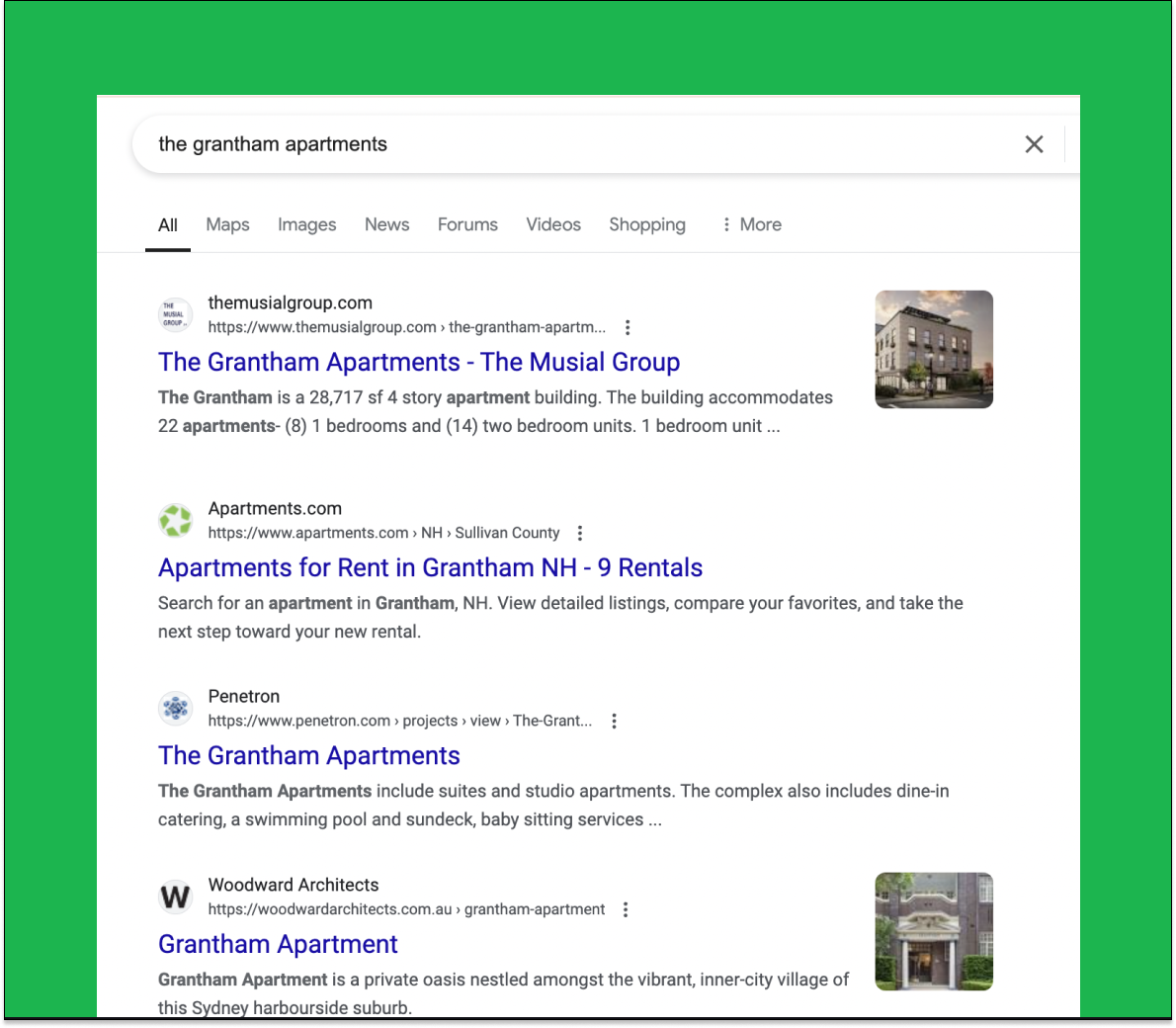
So, do we have a winner?
After exhausting searches and cross-checks for the above, the team determined that none of these brands were quite right (womp, womp!). Additional namestorming and research are needed to isolate a brand name that checks all the boxes below. (Good thing FINE’s on the case!)
Recap: An SEO Checklist for Brand Naming
Naming a new brand is not easy. Factoring in SEO considerations can make it even more of a process. But if you’re willing to put in the time and effort, it’s possible to create a powerful new brand entity that resonates with your team, with your customers, and in search. Trust us when we say that your effort will be rewarded.
Here are key SEO considerations to bake into your brand naming process:
- Short and easy to spell
- Add a strategic keyword to the brand seed name
(Kermit + The Frog, Myrtle + Apartments) - The seed term doesn’t have any major controversy on a global level
(ex: Kermit, Vera) - There are no similar brand names on an industry level
(ex: Brand Seed Term + Industry, Harlowe Apartments) - There are no similar brand names on a geographic level
(ex: Brand Seed Term + Local Qualifier, Myrtle Brooklyn)
Here are key domain name considerations for SEO:
- Domain name is easy to read and type
- A strategic keyword can be discretely added to the domain
- Purchase all related domains so that no one else can claim them.
In closing: Building a strong brand entity is about more than just picking a catchy name; it’s about creating an identity that works to your best advantage in SERPs too. By factoring in SEO considerations, you’re setting the foundation for a holistic branding ecosystem that resonates just as much with people as it does with search engines.
Addendum: Read / Watch These Too
- How to Establish Your Brand Entity for SEO: A 5-Step Guide by Jess Scholz for Search Engine Land
- How to Select the Best Local Name for Your Business by Miriam Ellis for Whitespark
- Pop-Up AMA: SEO, Brands & Google - hosted by Garrett Sussman and iPullRank.